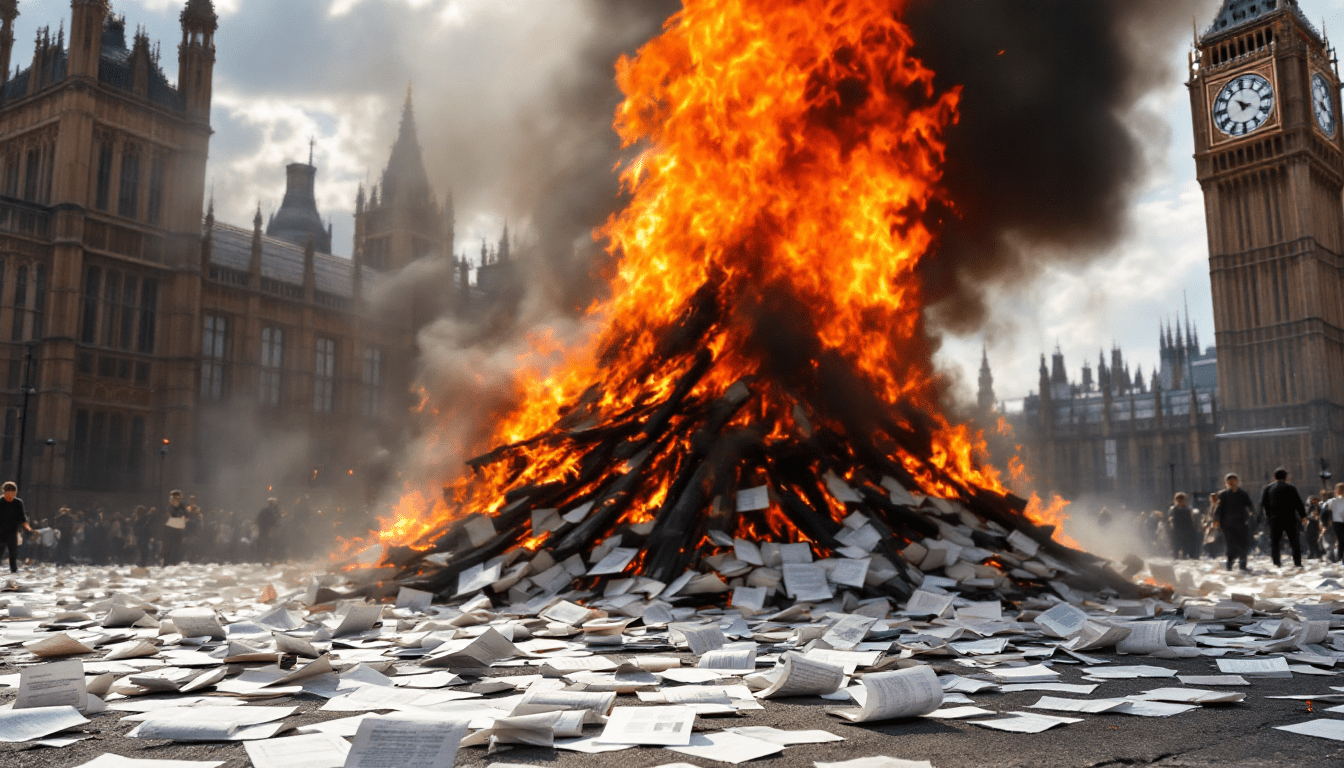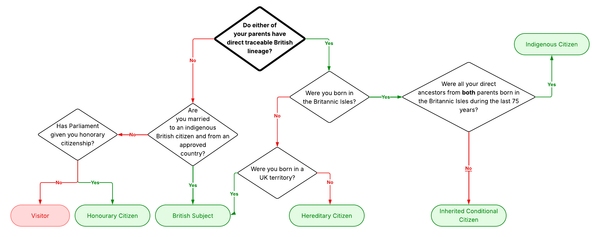The Oblivion Act: Mass Auto-Repeal Of All Legislation After 1900
The Great Repeal program requires a terrifying threat to undergird its revolutionary tensile strength. The Oblivion Act is the most radical bill in British history: it wipes all legislation passed by Parliament, entirely, other than what we explicitly save.

How many times have you heard the same midwit excuse there's too much legislation to go through, and it's impossible to deal with it all? Do you really care about the Uganda Railway Act 1900? Have you read all 60,000+ pieces of legislation? Has anyone? Is it reasonable single acts of parent primary legislation can generate 2000 child secondary instruments?
What if we reversed the process and "whitelisted" law rather than blacklisting it for repeal and removal? Then made MPs actually work for their living if they really cared about the effects of the law at all? It's an exceptionally aggressive and frightening prospect to the lazy parliamentarian, but an exciting new horizon to the futurist. Think of it as analogous to ripping out the mould from a wall, or fumigating a building. Stripping down the broken old varnish to give furniture a new finish.
What would you preserve if you knew you didn't have to go through 125 years of bureaucratic nonsense?
During the Stuart Restoration of 1660, Charles II's government declared all Commonwealth legislation "null and void" as acts of "usurping powers", whilst Scotland's Rescissory Act 1661 made all legislation back to 1633 'void and null'. The key difference is 1660 involved immediate blanket annulment based on constitutional illegitimacy, whilst the our bill proposes systematic temporal repeal with staged preservation opportunities.
In that spirit, we present the most radical piece of legislation ever to grace the Houses of Parliament, even during and after the Civil War: the Oblivion Act.
Read the draft Oblivion Act. in full here (11 pages, before schedules):
The Mechanics of Mass Repeal
The Oblivion Act represents perhaps the most radical piece of constitutional legislation ever proposed for the United Kingdom. This extraordinary Bill would systematically repeal virtually every law enacted since 1900, creating an unprecedented "legislative reset" mechanism. The proposal fundamentally challenges conventional approaches to legal reform by reversing the presumption of legislative continuity.
Preliminary Provisions and Definitions
Section 1 establishes the Act's basic framework, with the crucial provision being subsection (3), which delays implementation of the substantive provisions until the staged repeal mechanism in section 3 takes effect. This creates a vital breathing space between Royal Assent and the commencement of wholesale legal destruction.
Section 2 provides essential definitions, most notably establishing "the relevant period" as 1st January 1900 to the day before Royal Assent. The definition of "primary legislation" encompasses Acts of Parliament across all devolved jurisdictions, whilst "secondary legislation" covers the vast array of statutory instruments, regulations, and orders created under enabling legislation. The phrase "specified legislation" refers to those enactments listed in the thirteen Schedules, which alone will survive the legislative apocalypse.
The Staged Repeal Mechanism
Section 3 forms the Act's revolutionary core. Rather than simultaneous destruction of 125 years of law-making, the provision creates a carefully orchestrated thirteen-month sequence. Laws from the Edwardian era face extinction after just one month, whilst the most recent legislation enjoys a full thirteen months' reprieve. This staggered approach serves multiple purposes: it provides time for considered assessment of each decade's legislative output, allows administrative systems to adapt gradually, and creates pressure for swift parliamentary action to preserve essential statutes.
MPs have 1 month per decade to save what they believe is necessary. Add it, or it goes. No more time, no extensions, you're done. We do not need law about Uganda from 1900.
The treatment of secondary legislation proves particularly sophisticated. Subsection (2) ensures regulations remain attached to their enabling Acts regardless of when created. A 1910 statute and its 1975 regulations face identical repeal timing, preventing the chaos of orphaned secondary legislation. Subsection (3) addresses the complex scenario where regulations derive power from multiple Acts across different decades, applying the "earliest enabling Act" rule to provide legal certainty.
Mechanisms of Destruction and Preservation
Section 4 defines repeal's devastating effect. Legislation doesn't merely cease operating prospectively; subsection (1) declares repealed statutes "deemed never to have had effect" from the repeal date. This retroactive annihilation goes beyond traditional repeal, effectively erasing laws from legal history. However, subsection (2) provides crucial protections for existing rights, ongoing proceedings, and accrued liabilities, preventing complete chaos in contractual relationships and court proceedings.
Section 5 creates the salvation mechanism through Schedule modification powers. The Secretary of State gains extraordinary authority to preserve legislation by adding it to the relevant Schedule, but these powers operate within strict constitutional constraints. The five-fold test in subsection (2) limits preservation to legislation necessary for constitutional government, public safety, fundamental rights, essential services, or international obligations. Crucially, subsection (3) subjects these life-or-death decisions to the affirmative resolution procedure, ensuring parliamentary control over the preservation process.
Administrative and Procedural Safeguards
Transitional Arrangements
Section 6 acknowledges the administrative nightmare inherent in such wholesale legal destruction. The broad regulation-making power in subsection (1) permits the Secretary of State to create emergency bridging arrangements. Subsection (2) specifically authorises temporary continuation of repealed legislation for specific purposes, function transfers between bodies, and emergency administrative structures. These provisions represent recognition of the practical impossibility of governing without legal framework during transition periods.
Parliamentary Oversight
Section 7 creates a mandatory reporting regime. Before each monthly repeal event, the Secretary of State must lay detailed reports examining the legislation facing destruction and proposing specific preservations. This requirement transforms what could be arbitrary executive decisions into transparent parliamentary processes. Subsection (2) empowers either House to force addition of legislation to Schedules through simple resolution, providing a democratic check on executive preservation decisions.
Constitutional and Practical Implications
The Sovereignty Question
The Act raises profound questions about parliamentary sovereignty's limits. Can Parliament bind itself to such systematic destruction of its own previous work? The traditional doctrine suggests future Parliaments retain absolute power to repeal the Oblivion Act itself, potentially halting the process mid-stream. However, the Act's structure creates powerful political and practical momentum towards completion once commenced.
Administrative Devastation
The practical consequences would prove extraordinary. Government departments would face sequential dismantling of their legal foundations over thirteen months. The early months would see destruction of Victorian-era constitutional settlements, potentially including fundamental statutes like the Parliament Act 1911. Later stages would eliminate the entire post-war welfare state framework, European Union legislation, and modern human rights protections.
Legal System Terror
Courts would confront unprecedented challenges. How does one interpret contracts made under legislation deemed "never to have had effect"? What precedential value do court decisions based on repealed statutes retain? The savings provisions in section 4(2) provide some protection, but cannot address every conceivable scenario arising from such systematic legal destruction.
The Preservation Process
Success or failure hinges entirely on the Schedule modification process. With potentially thousands of statutes and millions of statutory instruments facing destruction, the Secretary of State and Parliament would face impossible time pressures. The thirteen-month window allows roughly four weeks' consideration per decade of legislation—deeply difficult, intentionally, for comprehensive review of complex regulatory frameworks built over decades.
Legislative Culture Revolution
Beyond its immediate destructive effects, the Act would fundamentally alter British legislative culture. Future Parliaments would operate knowing their work faces potential systematic destruction. This knowledge might encourage more careful drafting, regular consolidation of statute books, and greater attention to legislative necessity. Alternatively, it might create perverse incentives towards legislative minimalism or constitutional entrenchment mechanisms.
Devolution Implications
The Act's extension to devolved legislation raises complex constitutional questions. Repealing Scottish Parliament Acts and Welsh Assembly Measures could trigger constitutional crises, particularly if the underlying devolution settlements themselves face destruction. The interaction between Westminster's claimed supremacy and devolved democratic legitimacy would face unprecedented testing.
International Obligations
Section 5's reference to "international obligations" acknowledges the Act's potential to place the United Kingdom in breach of countless treaty commitments. European Convention on Human Rights obligations, trade agreements, and international regulatory standards all depend on domestic implementing legislation. Wholesale repeal could trigger international legal consequences extending far beyond domestic chaos.
We're Not Messing About
The Oblivion Act represents either visionary constitutional reform or reckless legislative vandalism, depending upon one's perspective. Its supporters might argue for the necessity of periodic legal housekeeping, eliminating redundant statutes and forcing active reconsideration of governmental functions. The Act embodies a radical conception of democratic renewal through destruction.
Critics will emphasise the catastrophic risks: constitutional crisis, administrative collapse, legal uncertainty, and international isolation. The Act's implementation would require governmental competence and parliamentary discipline on a scale never before attempted. The thirteen-month timeline appears almost impossible for preserving essential legal frameworks whilst eliminating genuine redundancy– unless you have people en par with Elon Musk.
Perhaps most significantly, the Act would irreversibly alter the relationship between past and present in British constitutional law. Rather than incremental evolution building upon inherited foundations, it proposes periodic revolutionary renewal through comprehensive destruction. Whether such radical discontinuity proves liberating or catastrophic remains the fundamental question facing any Parliament bold enough to contemplate legislative oblivion.
A New Breed & New Era
Implementation of the Oblivion Act would demand a revolutionary transformation in parliamentary culture and capability. Success requires politicians who think at silicon valley speed rather than Westminster pace - legislators capable of processing decades of legal complexity within weeks whilst making life-or-death decisions about constitutional architecture under relentless time pressure.
The current breed of MP, accustomed to leisurely consideration of incremental reform, would prove wholly inadequate for such systematic legal triage. The Act demands parliamentarians with the analytical rigour of management consultants, the decisiveness of emergency room doctors, and the constitutional vision of founding fathers. They must distinguish essential from redundant across 125 years of accumulated legislation whilst the clock ticks towards legislative extinction.
Such transformation appears almost impossibly ambitious. Yet the Oblivion Act serves a valuable purpose even without enactment: as an object of salutary fear for complacent legislators. The mere possibility of systematic legal annulment should concentrate parliamentary minds wonderfully, encouraging more rigorous attention to legislative necessity and constitutional coherence.
Lazy MPs who accumulate statute upon statute without consideration of cumulative effect face implicit threat from this legislative sword of Damocles. The Act embodies a constitutional ultimatum: reform yourselves voluntarily through disciplined lawmaking, or face involuntary reformation through systematic destruction. In this sense, the Oblivion Act succeeds whether implemented or merely contemplated - as catalyst for the parliamentary revolution modern governance desperately requires.





